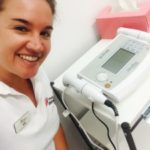On Acupuncture and Dry Needling
Clonazepam For Sale Online I still remember plain as day the lady’s butt cheek that ignited my interest in acupuncture and dry needling. It was a very knotty butt cheek and belonged to a lovely lady who regularly spent hours in a car seat driving to a small town where I was working as a young and somewhat inexperienced Chiropractor.
https://leandroygaia.com/contact-us/ I’d been working on this patient’s glut muscles for a few weeks, using pressure and stretching techniques with the aim of de-knotting and therefore restoring proper function to her muscles. After 3 or 4 treatments we agreed that my treatment wasn’t working & I referred her to a local Osteopath who had a good reputation.
Clonazepam For Sale Online The following week I was surprised to see her name in my appointment book again. When I saw her, I could tell by the way she skipped into my treatment room that her butt cheek issue had been resolved. She told me that the Osteopath had ‘needled’ her glut muscles and she’d felt instantaneous relief as the needle caused her muscles to relax. I re-examined her and agreed that her gluts were nicely de-knotted. After I adjusted her lower back & her hip, her movement was restored and both her and I were happy.
follow link  I now understand that what my patient was describing is called the ‘twitch response’ which is a cascade of events in the muscle tissue initiated by the insertion of
I now understand that what my patient was describing is called the ‘twitch response’ which is a cascade of events in the muscle tissue initiated by the insertion of  a fine needle into a trigger point (the tightest fibres in the muscle). The insertion of the needle breaks the muscle spasm cycle and causes the muscle to relax.
a fine needle into a trigger point (the tightest fibres in the muscle). The insertion of the needle breaks the muscle spasm cycle and causes the muscle to relax.
https://hbctv.net/about/ These are the times when I use dry needling or acupuncture in my clinic:
- To break tension patterns in muscles that are well established, often around the neck and shoulders.
- When adjustments aren’t holding as well I feel that they should be, needling trigger points in the surrounding muscles can help.
- Using traditional acupuncture points to alleviate stress and relax the nervous system.
- Stubborn trigger points in muscle that aren’t responding or are slow to respond to deep tissue massage, especially in the forearms of my truck drivers and farmers who are prone to a bit of tennis elbow.
Clonazepam For Sale Online I have a special interest in acupuncture and have attended courses in the UK and United States learning the latest techniques and styles. Many of my friends who are health professionals use dry needling because they find it is an effective tool and as our businesses depends on delivering good results, we tend to use the best techniques that we can find.
follow site Not everyone responds well to acupuncture. I find that patients will either:
- Respond very well very quickly
- Respond well but more slowly
- Not respond/no change in muscle tension
https://allaboutthestage.com/page/4/ I have many patients who were horrified when I first suggested to them trying some dry needling because they ‘hated needles’ or had ‘a fear of needles’, but they tried it once and had such good results that they now see me every couple of months for a needle in the shoulder or the hip.
Clonazepam For Sale Online If you have any questions about dry needling or acupuncture, then feel free to speak to me. ~ Allie X


